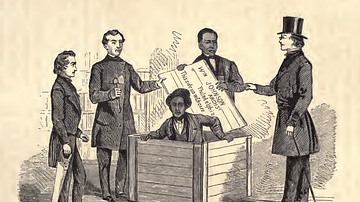Review

| Rating: | |
|---|---|
| Title: | The Problem of Immigration in a Slaveholding Republic: Policing Mobility in the Nineteenth-Century United States |
| Author: | Kevin Kenny |
| Audience: | University |
| Difficulty: | Medium |
| Publisher: | Oxford University Press |
| Published: | 2023 |
| Pages: | 344 |
This book, "The Problem of Immigration in a Slaveholding Republic" by Kevin Kenny, tries to analyse the diverse ways in which the American immigration policy was shaped as a result of slavery, its existence, abolition, and lasting legacy. Kenny’s book is recommended primarily for historians as well as law and university-level students and researchers who are keen to understand the evolution of America’s immigration and legal systems.
The present book, The Problem of Immigration in a Slaveholding Republic by Kevin Kenny, focuses on the period between the American Revolution (1765-1783) and the end of the Reconstruction Era (1863-1877) and discusses at length the little-known process of shifting of the immigration policy from the local to the national level. The development unfolded over the 18th and 19th centuries. Taking a top-down approach, Kenny seeks to address an important issue about human mobility and authority over it.
Given that histories of immigration and labour are closely related, the chapters in this study try to directly address several pertinent issues related to labour. To provide his readers with a clear picture of the evolutionary history of America’s immigration policy, the author has consciously chosen to move away from social history to the realm of legal, political, and constitutional history. Kenny’s book is recommended primarily for historians as well as law and university-level students and researchers who are keen to understand the evolution of America’s immigration and legal systems. Additionally, history enthusiasts from different walks of life who are interested in studying issues pertaining to slavery, the place of black people in the American society, the American Civil War, and American Independence will find this book of immense academic value. The intended readers of the book range from subject specialists to law and university-level students and general history enthusiasts.
The seven chapters, along with an Introduction and Epilogue, show that in the years immediately after the American Revolution, it was the states that controlled mobility within and outside their borders. They also set their own rules for community membership. In fact, before the Civil War, almost all the states, laid down their own rules concerning the movement of free black people, enslaved people as well as immigrants. The federal government, in the pre-Civil War era, had no role to play in such matters. According to the states, such restrictions were necessary in that they helped them to protect themselves from diseases and crimes. The author, in this regard, argues that states passed particular laws that prohibited the entry of foreign convicts, Blacks, and sick individuals. Strict instructions were given to the shipmasters to post bonds or pay taxes for passengers who could be convicted and quarantined individuals who carried contagious diseases and deport immigrant paupers. In addition to this, the shipmasters were also vested with the responsibility of expelling and imprisoning free Black people and Black sailors, respectively. Significantly, since these laws affected the foreigners and their mobility, they, as Kenny argues, comprised the immigration policy of America. Further, as Kenny has argued the defenders of slavery, throughout the antebellum period, feared that Congress would take charge and centralize the existing immigration system. Given that Congress was capable of regulating the movement of Black people interstate slave trade, the fear of the proponents was, to an extent, justified.
The conclusion of the Civil War and the abolition of slavery in the latter half of the 19th century led to the creation of a conducive environment for the emergence of a national immigration policy. The policy was initially directed, not towards the free and enslaved black population, but Chinese immigrants. The author notes that while the Europeans enjoyed unrestricted admission to the United States of America, the Chinese immigrants were denied admission through punishment, techniques of registration, and deportation. The same techniques, it may be borne in mind, were first used against the free Black people in the antebellum South. The present study also draws its readers’ attention to the Supreme Court ruling which stated that immigration authority is an integral part of national sovereignty, and it did not require any constitutional justification. Going beyond the period of Reconstruction, Kenny notes that in contemporary America, it is the federal government that is vested with the responsibility of including or excluding individuals and groups. Interestingly, however, there are, even today, some states which control the movement of immigrants and punish them. Such states decline to provide a haven to immigrant populations and, at the same time. At the same time, some states refuse to act as agents of federal law enforcement by providing sanctuaries to ‘legal’ as well as ‘illegal’ immigrants.
Kevin Kenny is Glucksman Professor of History and Director of Glucksman Ireland House at New York University. Based on a close reading of archival sources and some of the landmark immigration law cases, this book makes for an exciting read. A crisp legal history, Kenny’s erudite work throws light on the long and tangled history of American immigration laws. By unveiling the complicated origins of incarceration, border control, and deportation, Kenny seeks to remind his readers that slavery at one time touched every aspect of American life, including the mobility of immigrants. The book makes a strong case that the contemporary immigration policy still bears the scars of the slaveholding republic. Given that the book is written in a coherent manner, and for more than one type of audience, it will be of interest to the specialists of the subject as well as non-specialists.
About the Reviewer
Cite This Work
APA Style
Saghar, A. (2024, December 16). The Problem of Immigration in a Slaveholding Republic: Policing Mobility in the Nineteenth-Century United States. World History Encyclopedia. Retrieved from https://www.worldhistory.org/review/500/the-problem-of-immigration-in-a-slaveholding-repub/
Chicago Style
Saghar, Amol. "The Problem of Immigration in a Slaveholding Republic: Policing Mobility in the Nineteenth-Century United States." World History Encyclopedia. Last modified December 16, 2024. https://www.worldhistory.org/review/500/the-problem-of-immigration-in-a-slaveholding-repub/.
MLA Style
Saghar, Amol. "The Problem of Immigration in a Slaveholding Republic: Policing Mobility in the Nineteenth-Century United States." World History Encyclopedia. World History Encyclopedia, 16 Dec 2024, https://www.worldhistory.org/review/500/the-problem-of-immigration-in-a-slaveholding-repub/. Web. 23 Apr 2025.




